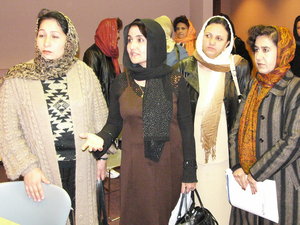Afghanistan educators visit Chadron State

A dozen school principals from Afghanistan spent 24 hours at Chadron State College this past Wednesday and Thursday, learning about higher education in America and also sharing some of the experiences they’ve had in their country with CSC faculty and students.
The group is spending three weeks in the United States with the Center for Afghanistan Studies at the University of Nebraska at Omaha serving as the host. This is the seventh group of educators from Afghanistan that has come to Nebraska after UNO received a $6.5 million grant from the U.S. Agency for International Development to help the Afghanistan educational system recover from that nation’s war with the Soviet Union during the 1980s and the ensuing occupation by the Taliban.
All the principals on the trip were women, who were forbidden to attend school or work outside the home from 1996 until late 2001, while the Taliban, made up of strict believers of “Sharia,” or Islamic law, ruled the country.
According to their interpreter, Abdul Raheeem Yaseer, most of the women in the group were teachers prior to the Taliban’s ascension to power. They are now serving as principals or assistant principals, but have only a minimum of training in administration.
The visitors have a great appreciation for the freedom they now enjoy in their homeland and an intense desire to improve their country’s educational system, Yaseer indicated. They are particularly appreciative of the leadership exerted by First Lady Laura Bush, who has insisted that the U.S. government assist women in Afghanistan.
Several CSC seniors who are preparing to teach cried when they heard of the oppression and turmoil many Afghanistan people, particularly women, went through before U.S. troops liberated the country a few months after the terrorist strikes on Sept. 11, 2001.
Naturally, the visitors were curious about what does and doesn’t work in the United States.
Both the visitors and CSC hosts asked numerous questions about the others’ educational systems. One question the Afghanistan educators asked a panel made up of CSC education professors was why a country with so many fine facilities and well-trained teachers still has students who do poorly in school. The chairman of the CSC Education Department, Don King, responded that students have different learning styles and even after years of coping with the problem, the U.S. educational system is still making adjustments to try to help all every student be successful.
They also were told that no matter how good the schools or the teachers may be, students with learning problems or from homes that are not supportive of education sometimes do not respond favorably.
“It takes the home, community and school to provide a good education,” said Dr. Patti Blundell, one of the panel members. “Students also have to be willing to work.”
Speaking through Yaseer, one of the principals asked if perhaps the students in the U.S. have too much freedom and not enough discipline
Another of the visitors wanted to know why American students don’t seem to be interested in what their government is doing. Blundell and another of the panelists, Stacy Beebe, noted that a majority of the students, particularly in this part of the country, are comfortable and don’t have much to complain about. Blundell also noted that following the 9/11 attacks, many more young people than usual volunteered to serve in the military, indicating they are willing to do their part to preserve freedom when necessary.
The principals expressed surprise that the U.S. curriculum is not dictated by the government, and that educators work together to set the standards the schools follow.
The schools in Afghanistan that the principals oversee are often huge with up to 10,000 students, particularly in Kabul, the capital. The classes are large and frequently held in shifts with some Afghani youths in school only a few hours a day.
Books and other learning materials are in short supply, but Nebraskans have contributed both books and cash to help improve the situation, Yaseer said.
Prior to departing for a trip to Mount Rushmore, the principals expressed appreciation for the hospitality they were shown. This was second group of female educators that Yaseer has brought to Chadron State.
During his visit a year ago, Yaseer said that many Afghani people once had the perception they had gained largely by watching movies that Americans are “rich, stingy and arrogant.” He said now they are generally liked in Afghanistan.
“The Afghani people view Americans as saviors while Iraqis see them as occupiers,” he stated.
Dr. Clark Gardener, CSC professor of education, said the visit was an eye-opening experience for both the Afghani and the American educators involved.
“I think everybody learned a lot,” he said. “I know I have a deeper appreciation for what people in some other countries go through to get an education. We’re very fortunate here.”
The on-campus visit was arranged by Steve Taylor, CSC assistant vice president for extended campus programs.
Category: Campus News
